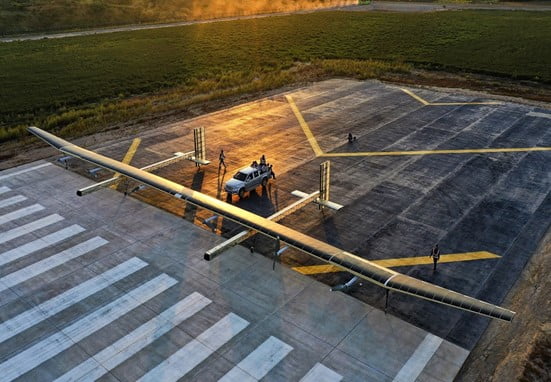Science and Technology
In News: China’s first fully solar-powered unmanned aerial vehicle, Qimingxing-50, or Morning Star-50, has successfully completed its maiden test flight with all onboard systems functioning optimally.
The Mechanics
- With a wingspan of 164-ft, the drone is a large machine powered entirely by solar panels.
- The high-altitude, long-endurance (HALE) UAV can stay airborne for long durations.
- Flies above 20-km altitude where there is stable airflow with no clouds.
- Helps these drones to make the maximum use of solar equipment to stay functional for extended durations.
- In fact, the drone can operate without a break for months, even years.

Cross between drone and satellite
- The fact that the drone can operate in near-space – 20 km to 100 km above the Earth’s surface – makes it capable of carrying out satellite-like functions.
- These drones are also referred to as ‘High Altitude Platform Stations’ or pseudo-satellites.
- China already has this capacity, but the Qimingxing-50’s long-endurance provides an added advantage to make this capability available over a longer period.
Significance
- Cost-effective to build
- Easy to launch and operate
- Being entirely powered by clean energy from the Sun, it can help boost China’s capabilities to operate in near-space and over the ocean.
- If satellite services are not available for, say, time-sensitive operations or in case of wartime disruption, then near-space UAVs can step in to fill the operational gap.
- This HALE UAV is capable of conducting high-altitude reconnaissance, apart from monitoring forest fires, providing communication and environment relay.
Has any other country achieved this?
- In July this year, the US Army helped test a solar-powered, near-space Airbus Zephyr S drone that set a new record by being airborne for 42 days.
Note:
- India’s PLI Scheme for Drone Industry
- Will incentivize emergence of Advanced Automotive Technologies global supply chain in India
- Help create additional employment of over 7.6 lakh people
- Incentives worth ₹ 26,058 crore will be provided to industry over five years
- It will bring fresh investments of over₹5,000 crore in three years and incremental production of over ₹ 1,500 crore
Source: The Indian Express
Previous Year Question
Q.1) Which one of the following statements best reflects the idea behind the “Fractional Orbital Bombardment System” often talked about in media? (2022)
- A hypersonic missile is launched into space to counter the asteroid approaching the Earth and explode it in space.
- A spacecraft lands on another planet, after making several orbital motions.
- A missile is put into a stable orbit around the Earth and deorbits over a target on the Earth.
- A spacecraft moves along a comet with the same speed and places a probe on its surface.














